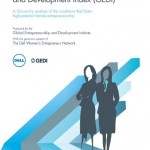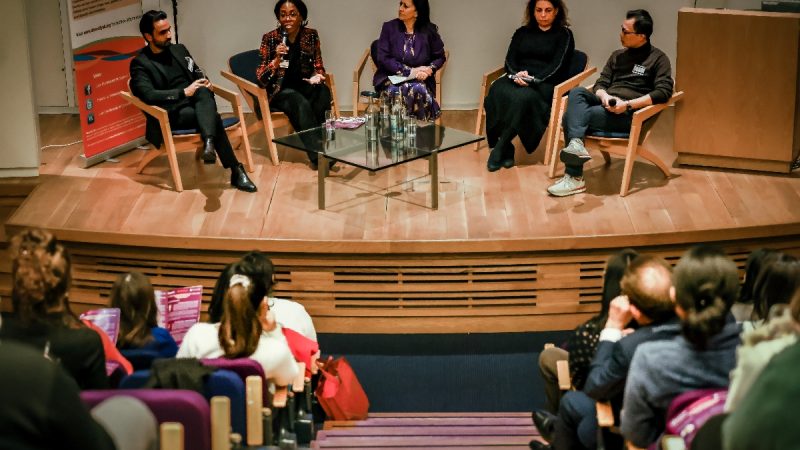GEDI Report: UK improving as environment for female entrepreneurship
 The UK is improving as an environment for women entrepreneurship, but still lags behind European countries including France and Germany, according to new research from Dell and the GEDI Institute. The highest performing countries in the 2014 Gender-GEDI rankings are all OECD member countries with highly developed economies, and for the second year in a row, the U.S. (83) and Australia (80) came out on top, followed by Sweden (73), France and Germany (tied at 67), Chile (55), the United Kingdom (54) and Poland (51). The remaining 23 of the 30 countries studied received an overall index score of less than 50 out of 100, indicating that many of the fundamental conditions for high potential female entrepreneurship development are generally lacking in the majority of countries.
The UK is improving as an environment for women entrepreneurship, but still lags behind European countries including France and Germany, according to new research from Dell and the GEDI Institute. The highest performing countries in the 2014 Gender-GEDI rankings are all OECD member countries with highly developed economies, and for the second year in a row, the U.S. (83) and Australia (80) came out on top, followed by Sweden (73), France and Germany (tied at 67), Chile (55), the United Kingdom (54) and Poland (51). The remaining 23 of the 30 countries studied received an overall index score of less than 50 out of 100, indicating that many of the fundamental conditions for high potential female entrepreneurship development are generally lacking in the majority of countries.
Dell announced on 9th June 2014 findings from the second annual Gender-Global Entrepreneurship and Development Index (GEDI) – a study measuring the female entrepreneurship environments in 17 countries. According to the report, more than 75 percent of the countries surveyed are not meeting the most fundamental conditions required for female entrepreneurs to prosper.
The UK has come in at 7th place with a ranking of 54/100, placing it behind the U.S. (83), Australia (80), Sweden (73), France and Germany (tied at 67), and Chile (55) – but the UK is also is one of just four countries to have improved their ranking, having moved ahead of last year’s ranking by one place.
Key UK findings include:
- The UK is a hotbed for ‘opportunity’ startups. 71% of female Total Early Phase Entrepreneurial Activity (TEA) businesses were started to: exploit a good opportunity, increase outcome, or fulfil personal aims – in contrast to those businesses started by individuals who have no other employment options. The UK scored the same percentage here as the US.
- UK winning at SME support and training. The UK was one of only 5 countries to achieve the highest score (100) for its SME training (the others being Australia, France, Sweden and the US). This measured SME training by its geographic availability across a country, its accessibility to women as well as men, its affordability for the majority of intended beneficiaries, its cultural appropriateness, and its taking into account women’s time constraints e.g. childcare
- UK aces workforce balance. Out of the 30 countries sampled, the UK achieved the highest labour force balance, measured as a 40:60 ratio of women to men across industries.
- British women’s confidence high. 91% of UK women see no perceivable differences between male and female executives. It shows confidence in women’s leadership and positive attitudes towards women in decision-making positions including those held by ‘high-potential’ female entrepreneurs
- Childcare leaves room for improvement. In terms of availability, quality, and affordability, the UK received a 60/100 score for access to childcare, lagging behind European countries such as France, which achieved 100/100
- Low female startup rate. The UK has 4.8 female startups for every 10 male startups, a similar figure to France (4.4:10), but lagging behind the US (7.1:10) and Australia (6.7:10)
- Low amount of female tech startups. The sample surveyed included 0% of female startups working in the tech sector. This is low in most countries, with 2% being the average for the sample.
Index Highlights
The Gender-GEDI is focused on the ways in which governments, institutions and corporations can support the effort of improving conditions for high-potential female entrepreneurship worldwide, and the 2014 results indicate that, across all nations, there is still much to be done, but by increasing access to education, technology, capital and networks, significant progress can be made.
Access to capital continues to be crucial. Access to a formal bank account is critical for entrepreneurs, especially since it is a necessary precursor to the financing (bank loans, credit lines, etc.) that fuels business growth. However, in 14 of the 30 countries, 50 percent or more of the female population is unbanked, with the gender disparities being highest in Turkey, where there is close to a 50 percent difference between men and women with bank accounts. Worldwide, women also receive less outside funding for their businesses than men.
Many industries remain male-dominated. Occupation crowding, or the existence of ‘male’ and ‘female’ jobs in a country’s economy, not only contributes to the gender wage gap but also results in the concentration of women’s entrepreneurial activity within specific sectors, which can be detrimental to fully utilizing a nation’s capacity for innovation. Out of the 30 countries, only eight received an overall balanced ratio across employment sectors, and in India and Pakistan, formal employment is so highly sex segregated that no employment sectors are balanced. Some countries and industries are beginning to address these occupational inequalities through voluntary quotas and targeted initiatives in the sectors that tend to marginalize women as a result of their ‘macho lab coat, hard hat and geek’ workplace cultures.
Female start-up activity is on the rise in emerging markets. Despite being ranked as top performers and characterized by overall favorable business environments, opportunity perception is fairly low in the United States and Europe with less than one third of the female population measured identifying business opportunities. In Africa, this number reaches 69 percent. Even with challenges around access to education and capital, female startup activity in the region is high at 86 female to every 100 male startups. Ghana has more female startups than male at a rate of 121 to 100. The Latin American and Caribbean countries included in the Index also exhibit high rates, with a regional average of 84 female to every 100 male startups.
More women are needed at the top. Even when the business environment is right, social norms can affect general societal support for women as entrepreneurs and their access to experiences as decision makers and leaders. Local attitudes towards women in executive positions can also effect whether women choose to take on these higher roles and responsibilities. Only five countries have 40 percent or more female managers (Jamaica, Ghana, Panama, United States and Nigeria), and in four countries the percentage of women is 10 percent or less: South Korea (10 percent), Turkey (10 percent), Japan (9 percent) and Pakistan (3 percent). While education forms the foundation for high potential entrepreneurship, management experience provides women with additional skills, experience and networks that facilitate female entrepreneurship success.
Women’s rights must be addressed first. In 22 of the 30 countries included in the Index, married women have fewer rights than married men, in 21 countries women lack the same access to employment as men, and in eight countries women do not enjoy the same legal access to property as men. A number of countries also limit women’s access to public spaces through legal restrictions and discriminatory practices. In order to foster female entrepreneurship, these countries must first address these fundamental weaknesses and take steps towards ensuring women equal rights.
About Dell Gender-GEDI Index
The 2014 Gender GEDI Index is sponsored by Dell and includes 30 countries: Australia, Bangladesh, Brazil, Chile, China, Egypt, France, Germany, Ghana, India, Jamaica, Japan, South Korea, Malaysia, Mexico, Morocco, Nigeria, Panama, Pakistan, Peru, Poland, Russia, South Africa, Spain, Sweden, Thailand, Turkey, Uganda, United Kingdom and the United States.
The Index focuses on high potential female entrepreneurs who are defined as ‘innovative, market-expanding and export-oriented.’ The Index combines variables that measure agency and institutions in a composite index in order to capture the multi-dimensional aspects of female entrepreneurship development. Data comes from existing internationally recognized sources such as the Global Entrepreneurship Monitor (GEM), World Economic Forum (WEF), World Bank, United Nations Educational, Scientific and Cultural Organization (UNESCO), International Labour Organization (ILO), etc. The GEDI Institute is a non-profit research and consulting firm based in Washington, D.C. that assists governments, donor agencies, foundations, international assistance providers, and global companies expand economic opportunities for individuals, build future markets for societies, and propel economic development for nations. It uses an innovative methodology to advance entrepreneurship, thereby accelerating economic growth.
Click here for a copy of the Gender_GEDI_Executive_Report-2014-final.




